Best Cavalier King Charles Spaniels Pet Insurance: Costs, Plans & FAQs
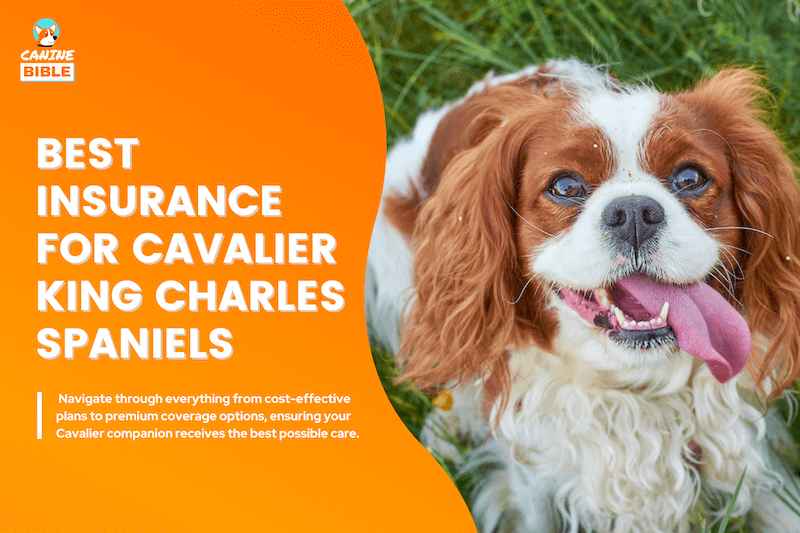
Canine Bible is reader-supported. We receive affiliate commissions via some of our links. This doesn’t affect rankings. Learn more.
As a devoted Cavalier owner, I’ve created the most comprehensive guide to finding the best pet insurance for Cavaliers. Cavalier King Charles Spaniels are not just pets; they’re special companions. They’re loving and sweet-natured, making them wonderful additions to any family. However, they can also be prone to various health problems and accidents, so having the right insurance is crucial. You might be wondering, is insuring your Cavalier truly worth it? I’ll share insights into the accidents and health conditions common among Cavaliers, including potential costs if an accident or illness occurs. I’ll also tackle some common questions about pet insurance to help you determine if it’s the best choice for you and your Cavalier. Let’s get started!

Why you should trust us: Our writers, editors, and in-house veterinarians spend hours analyzing and reviewing products and services to help find what’s best for you. Read the product review methodology and editorial mission to find out how we test, analyze, and rate.
Best Cavalier King Charles Spaniels Pet Insurance — At A Glance
What Is Cavalier King Charles Spaniels Pet Insurance: Pet insurance is a healthcare policy that provides coverage for your pet, offering reimbursement for specific veterinary expenses. This ensures that your savings remain secure despite unforeseen medical costs. Such a policy involves a monthly premium. Should your pet fall ill or sustain an injury, you would file a claim with the insurance company to recoup your expenses.

The monthly premium for Cavalier King Charles Spaniels pet insurance
$30 to $63
How Much Does Pet Insurance Cost For Cavalier King Charles Spaniels?
The cost of insurance for a Cavalier dog will vary based on several factors, including the pet’s existing health conditions, sex, age, and the area you reside in. It’s important to remember that with the progression of veterinary technology and increased claims within your locality, your insurance premiums may rise. For example, even if your Cavalier is quoted at $55 per month, this rate is not fixed and could change.
According to our research, plans for Cavaliers can range from $30 to $63. You may spend more or less depending on where you live, the deductible rate and the reimbursement percentage you choose. Cavalier dog owners can expect to pay an average $42 monthly premium.
Pet Insurance Quotes For Cavalier King Charles Spaniels
We compared quotes from renowned pet insurance providers to estimate your expected average monthly premium for different life stages in Cavaliers.
| Company | Deductible | Reimbursement | Annual Reimbursement Limit | Monthly Price | Location | Gender | Breed | Age |
|---|---|---|---|---|---|---|---|---|
| Lemonade | $500 | 70% | $100,000 | $32.76 | SC, 29044 | Male | Cavalier King Charles Spaniel | 6 years |
| Spot | $500 | 70% | Unlimited | $57.74 | SC, 29044 | Male | Cavalier King Charles Spaniel | 6 years |
| Healthy Paws | $500 | 70% | Unlimited | $36.95 | SC, 29044 | Male | Cavalier King Charles Spaniel | 6 years |
| Lemonade | $500 | 70% | $100,000 | $33.17 | CA, 95842 | Female | Cavalier King Charles Spaniel | 2 year |
| Spot | $500 | 70% | Unlimited | $63.16 | CA, 95842 | Female | Cavalier King Charles Spaniel | 2 year |
| Healthy Paws | $500 | 70% | Unlimited | $30.56 | CA, 95842 | Female | Cavalier King Charles Spaniel | 2 year |
| Lemonade | $500 | 70% | $100,000 | $30.95 | TX, 75219 | Female | Cavalier King Charles Spaniel | 6 months |
| Spot | $500 | 70% | Unlimited | $62.46 | TX, 75219 | Female | Cavalier King Charles Spaniel | 6 months |
| Healthy Paws | $500 | 70% | Unlimited | $33.22 | TX, 75219 | Female | Cavalier King Charles Spaniel | 6 months |
Cavalier puppy monthly cost: $42
Adult Cavalier monthly cost: $42
Senior Cavalier monthly cost: $42
Is Pet Insurance For Cavalier King Charles Spaniels Worth it?
The decision to purchase pet insurance for your Cavalier hinges on various factors, including your pet’s health risk proclivity, tolerance for financial risk, and overall financial circumstances.
Consider a scenario where your Cavalier falls seriously ill or suffers an injury from an accident, incurring veterinary bills in the thousands. On average, the most common dog treatments cost $254.[1] A more severe and common condition in Cavalier, like hip dysplasia, can cost between $1,500 and $6,000 to diagnose and treat. Can you pay for an unexpected $6,000 veterinary bill out-of-pocket? Most people can’t. The Federal Reserve states that 40% of Americans don’t have enough savings to cover a $400 emergency and 57% of U.S. adults cannot afford a $1,000 emergency expense.[2]
Investing in pet insurance for your Cavalier is a wise choice to protect your finances and ensure your dog can receive the necessary care. With pet insurance, should an unexpected accident or illness occur, you could be reimbursed for 70% to 100% of the veterinary costs, depending on the details of your plan and provider. Pet insurance gives peace of mind, knowing your finances and pet’s health are covered.
Predict & Protect Your Cavalier King Charles Spaniel’s Future Health
Canine Bible uses years of clinical health findings, pet insurance data points, trends, and surveys to identify common health conditions in dogs. By gaining insight into your Cavalier’s potential future health issues and risks, you can take preventive action today and ensure that your Cavalier does not become a part of these statistics.
1 in 3
dogs will need emergency veterinary treatment every year.
$250 to $8K
is the average cost of unexpected veterinary care for dogs.[3]
32%
Cavalier dogs are prone to develop
cardiac disorders.
22%
of Cavaliers develop
dermatological issues[4]
If you know your dog’s breed is predisposed to certain health issues, we strongly advise getting a pet insurance policy while your dog is still healthy. Chronic health conditions, emergencies, and vet visits can rack up costs throughout your Cavalier’s life. Pet Insurance can spare you a lot of financial trouble.
Dogs that develop chronic conditions under pet insurance coverage are guaranteed reimbursement for these issues for the duration of their life.Most Common Health Conditions In Cavaliers
Cost to treat cardiomyopathy
Cardiomyopathy in dogs refers to heart muscle diseases impairing the heart’s ability to pump blood effectively. This condition can lead to heart enlargement, diminished cardiac function, and ultimately heart failure.
*The overall cost of diagnosing and treating illnesses and injuries may vary. The above cost is based on average veterinary vet bill reports and claims submitted by pet insurance policyholders. We’ve used a 90% reimbursement rate for this scenario.
Cost to treat ear infections
Ear infections in Cavalier are common due to their floppy ears, which trap moisture and debris, creating a breeding ground for bacteria and yeast. Symptoms include scratching, redness, and odor. Regular cleaning and veterinary care are essential for prevention and treatment.
*The overall cost of diagnosing and treating illnesses and injuries may vary. The above cost is based on average veterinary vet bill reports and claims submitted by pet insurance policyholders. We’ve used a 90% reimbursement rate for this scenario.
Cost to treat hip dysplasia
Hip dysplasia involves abnormal development of the hip joint, leading to looseness and instability. This genetic disorder is exacerbated by rapid growth, obesity, and environmental factors. Symptoms include limping, difficulty in movement, and arthritis.
*The overall cost of diagnosing and treating illnesses and injuries may vary. The above cost is based on average veterinary vet bill reports and claims submitted by pet insurance policyholders. We’ve used a 90% reimbursement rate for this scenario.
Cost to treat entropion
Entropion in Cavalier is a condition where the eyelid rolls inward, causing eyelashes to rub against the cornea. This results in discomfort, tearing, and potential corneal damage. It’s often inherited, though can also arise from eyelid injuries or muscular spasms. Treatment typically involves surgical correction.
*The overall cost of diagnosing and treating illnesses and injuries may vary. The above cost is based on average veterinary vet bill reports and claims submitted by pet insurance policyholders. We’ve used a 90% reimbursement rate for this scenario.
Cost to treat mitral valve disease
Cavalier often suffers from mitral valve disease, where the heart’s mitral valve deteriorates. This leads to blood flow issues and potential heart failure. Aging and genetic factors predominantly cause this condition, affecting the dog’s overall cardiac health and stamina.
*The overall cost of diagnosing and treating illnesses and injuries may vary. The above cost is based on average veterinary vet bill reports and claims submitted by pet insurance policyholders. We’ve used a 90% reimbursement rate for this scenario.
Cost to treat deafness
In Cavaliers, deafness can be present from birth or acquired later. Hereditary deafness is associated with genes affecting pigmentation, while acquired cases may result from infections or age-related degeneration. These dogs might show inattentiveness to auditory cues. Confirming deafness involves auditory tests, and adapting training methods is key for managing it.
*The overall cost of diagnosing and treating illnesses and injuries may vary. The above cost is based on average veterinary vet bill reports and claims submitted by pet insurance policyholders. We’ve used a 90% reimbursement rate for this scenario.
Cost to treat epilepsy
Epilepsy in Cavaliers is a neurological condition characterized by recurrent seizures, which can range from mild, barely noticeable episodes to severe convulsions. The cause is often genetic, making it a hereditary issue within the breed.
*The overall cost of diagnosing and treating illnesses and injuries may vary. The above cost is based on average veterinary vet bill reports and claims submitted by pet insurance policyholders. We’ve used a 90% reimbursement rate for this scenario.
Cost to treat patellar luxation
Patellar luxation in Cavaliers involves the dislocation of the kneecap from its normal position. This condition, often genetic, can cause lameness or an abnormal gait. Factors like trauma or congenital defects contribute to its development. Severity varies, potentially leading to arthritis or reduced mobility in affected dogs.
*The overall cost of diagnosing and treating illnesses and injuries may vary. The above cost is based on average veterinary vet bill reports and claims submitted by pet insurance policyholders. We’ve used a 90% reimbursement rate for this scenario.
Cost to treat obesity
Obesity is a significant concern in Cavaliers, primarily caused by overfeeding and lack of exercise. This excess weight puts strain on the dog’s body, leading to joint problems, diabetes, and reduced lifespan. Proper diet and regular exercise are crucial for prevention.
*The overall cost of diagnosing and treating illnesses and injuries may vary. The above cost is based on average veterinary vet bill reports and claims submitted by pet insurance policyholders. We’ve used a 90% reimbursement rate for this scenario.
Cost to treat hernia
Hernias in Cavaliers often involve the abdominal wall, where internal organs or tissues protrude through a gap in the muscle. Common types include umbilical hernias, where the belly button area doesn’t close properly, and inguinal hernias, where the groin area is affected. They can be congenital or result from injury.
*The overall cost of diagnosing and treating illnesses and injuries may vary. The above cost is based on average veterinary vet bill reports and claims submitted by pet insurance policyholders. We’ve used a 90% reimbursement rate for this scenario.
Cost to treat ichthyosis
This is a skin condition in Cavaliers where the skin develops excessive scales, resembling fish scales, hence the name. It’s genetic and usually apparent from a young age. Symptoms include flaky skin, dandruff, and sometimes itching. The severity can vary, and it’s generally a cosmetic issue, though severe cases can require management.
*The overall cost of diagnosing and treating illnesses and injuries may vary. The above cost is based on average veterinary vet bill reports and claims submitted by pet insurance policyholders. We’ve used a 90% reimbursement rate for this scenario.
Cost to treat syringomyelia
A serious neurological condition where fluid-filled cavities or cysts form within the spinal cord near the brain. It’s thought to be related to skull malformation that doesn’t leave enough space for the brain. Symptoms include neck pain, sensitivity, and odd scratching motions. It can be painful and debilitating.
*The overall cost of diagnosing and treating illnesses and injuries may vary. The above cost is based on average veterinary vet bill reports and claims submitted by pet insurance policyholders. We’ve used a 90% reimbursement rate for this scenario.
Cost to treat gastritis
Gastritis refers to inflammation of the stomach lining, which can be acute or chronic. Dietary indiscretion, infections, stress, or chronic health conditions can cause it. Symptoms include vomiting, reduced appetite, and abdominal pain. Treatment involves managing the underlying cause and dietary adjustments.
*The overall cost of diagnosing and treating illnesses and injuries may vary. The above cost is based on average veterinary vet bill reports and claims submitted by pet insurance policyholders. We’ve used a 90% reimbursement rate for this scenario.
Why Get Pet Insurance For Cavalier King Charles Spaniels?
Benefits For Cavaliers
Benefits For Owners
How to Pick The Best Cavalier King Charles Spaniels Pet Insurance
Best Pet Insurance For Cavalier King Charles Spaniels
1. Best Overall Cavalier King Charles Spaniel Pet Insurance
Why we picked and recommended it: We named Lemonade our best overall pet insurance for Cavaliers for its comprehensive coverage, pricing, availability, and customer service. Lemonade premiums usually start at just $10 monthly, the lowest in the industry. We ran a few quotes for a healthy Cavalier at a $500 deductible and 70% coverage to estimate your monthly premium. Based on our research, you can expect to pay between $30 and $33 monthly. We love that Lemonade is tech-forward, making it easy to manage your policy and file claims through an app. Their plans cover accidents and illnesses, including injuries, poisonings, broken bones, sprains, infections, general sicknesses, cancer, heart disease, hip dysplasia, hernias, skin conditions and more. They also offer several add-ons to help pet owners pay for exam fees, physical therapy, and preventive care.
2. Best Personalized Cavalier King Charles Spaniel Pet Insurance
What sets it apart from competitors: Spot Pet Insurance offers seven annual limit options, three reimbursement levels, and five annual deductibles. They offer the lowest deductible in the industry ($100), meaning that when your Cavalier gets sick, you pay less upfront before your plan starts paying. With so many customization options, this company is our top pick for finding a plan for meeting your specific financial needs and those of your pet. Spot’s policies also cover some items, such as exam fees and microchipping, that many other pet insurance providers don’t offer. They also have one of the cheapest plans for accident-only coverage, making it perfect for pet owners who only need minimal coverage. We ran a few quotes for a healthy Cavalier at a $500 deductible and 70% coverage, based on our research, you can expect to pay between $57 and $63, but prices may vary depending on your location, Cavalier’s age, and other factors. Spot covers you when your Cavalier gets hurt unexpectedly, from tooth extractions and torn ligaments to surgery and hospitalizations.
3. Best No-Cap Payout Cavalier King Charles Spaniel Pet Insurance
What sets it apart from competitors: Healthy Paws offers the benefit of no cap payout, meaning there’s no maximum limit on the amount they will pay, which is particularly advantageous for severe conditions or chronic diseases that require ongoing, expensive treatments. With no financial cap, you can choose the best treatments for your pet. This can include access to advanced medical procedures, specialized surgeries, or cutting-edge treatments that might otherwise be prohibitively expensive. Additionally, Healthy Paws stands out for its quick claim processing, typically paying 99% of claims in two days, notably faster than many competitors. We ran a quote for a healthy Cavalier at a $500 deductible with 70% coverage. Depending on your location, pet’s age, and other factors, you can expect to pay between $30 and $37. Healthy Paws insurance plans cover accidents and illnesses, cancer, emergency care, genetic conditions, alternative care, etc. They have competitive premium prices and fewer coverage exclusions.

Types of Pet Insurance Coverage For Cavalier King Charles Spaniels
There are two main types of pet insurance plans.
What Does Pet Insurance Not Cover?
When choosing pet insurance for your Cavalier, reviewing and understanding your policy’s exclusions is important.
Exclusions vary based on the pet insurance company and the policy you choose. Be sure to review the list of exclusions before purchasing pet insurance to confirm that your Cavalier is adequately covered by the plan you select and help prevent surprises in the future.
Pet Insurance For Cavalier King Charles Spaniel Puppies
Should you get pet insurance for your Cavalier puppy? Here are the top reasons you should consider Cavalier’s puppy insurance.
Average Cost of Cavalier King Charles Spaniels Vet Bills
This is what you will pay out-of-pocket on average if you don’t have pet insurance or a wellness plan.
Average Cost of Typical Vet Procedures
| Typical Vet Procedure | Average Cost of Procedure |
|---|---|
| Puppy vaccinations | $75 - $100 |
| Flea & tick prevention | $40 - $200 |
| Heartworm prevention | $24 - $120 |
| Spay or neuter surgery | $200 - $800 |
| Annual exam | $240 - $600 |
| Teeth cleaning | $200 - $500 |
| Microchip | $40 |
Average Cost of Emergency Vet Procedures
| Typical Vet Procedure | Average Cost Of Procedure |
|---|---|
| General consultation/exam | $100 - $150 |
| General bloodwork | $80 - $200 |
| X-rays | $150 - $250 |
| Ultrasound | $300 - $600 |
| 1-2 day hospitalization | $600 - $1,700 |
| 3-5 days holspitalization | $1,500 - $3,500 |
| Wound treatment & repair | $800 - $1,500 |
| Emergency surgery | $800 - $2,500 |
| Oxygen therapy | 500 |
Sources: 5 & 6
Factors That Impact the Cost of Your Cavalier King Charles Spaniels Pet Insurance Policy
Deductibles, co-pays & coverage limits
The lower the amount you pay out of pocket for your pet’s care, the higher your insurance premium will be. For instance, selecting a deductible of $300 instead of $800 means you’ll get reimbursed quicker for your pet’s care, but it also leads to higher premium payments.
Breed
Certain breeds are prone to congenital health issues. For example, breeds such as Cavaliers often struggle with Cancer and bloat. These breed tendencies could influence your pet insurance expenses.
Location
Local veterinary care expenses are taken into account by pet insurance companies when setting the price of your policy.
Pet’s Age
Older pets generally face more health problems, which results in higher insurance premiums because there is a higher risk for the insurance company.
Understand Insurance Policy Basics
How Does Pet Insurance Work?
Imagine your Cavalier’s pet insurance policy has the following terms:
Now, let’s say your Cavalier incurs a veterinary bill of $4,300 for medical treatment.
This example assumes you haven’t yet met your deductible for the year. If you’ve already met your annual deductible, you won’t have to pay again for this or any new claims within the same policy year. And, since every claim you make contributes to your annual payout limit after the insurance company pays $2,660 for this claim, the remaining yearly payout limit is $35,000 – $2,660 = $32,340.
Frequently Asked Question
Cavalier Pet Insurance — Conclusion
We are proponents of insuring our pets. Dogs are family, and we must treat them as such, especially regarding their health. We hope this guide has helped you understand what to expect when insuring your Cavs and given you more knowledge about the best pet insurance plans.
Like It? Subscribe & Share!
Disclaimer: The details about insurance company offerings, including prices, availability, and contract specifics, can change at any time and are at the discretion of the insurance company. This website does not control these changes. The information provided here is for reference only. It is important to thoroughly read and understand your policy before signing up for a new insurance contract, as your situation may differ from the examples used in this article.
Sources
Canine Bible uses only high-quality sources, including peer-reviewed studies, to support the facts within our articles. Read our editorial process and product review methodology to learn more about how we fact-check, test products, and keep our content accurate, reliable, and trustworthy.
- Breiner, B. (2023). Average Cost of Pet Insurance: 2023 Quotes. ValuePenguin.
- Gillespie, L. (2023, February 23). Bankrate’s Annual Emergency Fund Report. Bankrate.
- Healthy Paws Pet Insurance. (2019). 2019 Cost of Pet Health Care Report.
- Summers, J. F., O’Neill, D. G., Church, D. B., Thomson, P. C., McGreevy, P. D., & Brodbelt, D. C. (2015). Prevalence of disorders recorded in Cavalier King Charles Spaniels attending primary-care veterinary practices in England. Canine Genetics and Epidemiology, 2(1).
- Average Cost Of Emergency Vet Visits | Find Out What You Will Pay. (2020, March 19). Emergency Vets USA.
- Cost of Owning a Dog: From Initial Cost to Annual Essentials. (n.d.). The Dog People.
Canine Bible authorship represents the unified voice of our entire editorial team and our in-house veterinarians rather than a single author. Each article, blog post, and review published under the Canine Bible name undergoes a rigorous review process, involving all team members to guarantee accuracy and up-to-date in accordance with the latest veterinarian research. This collaborative effort is an integral part of our editorial process and aligns with our four pillars of content creation. This approach ensures our content is backed by expert knowledge and factual information, offering our readers reliable, actionable, and trustworthy content.


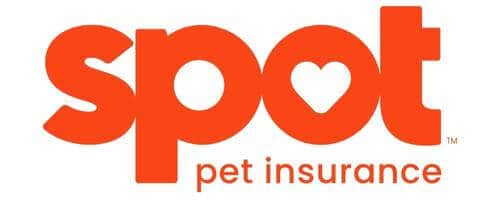
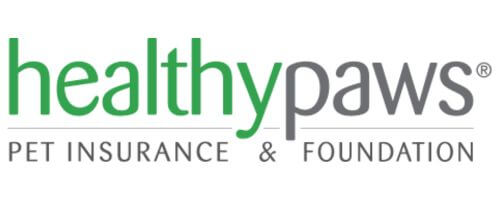

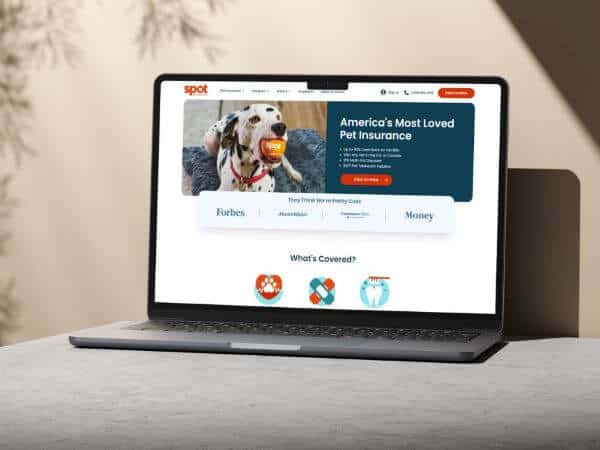


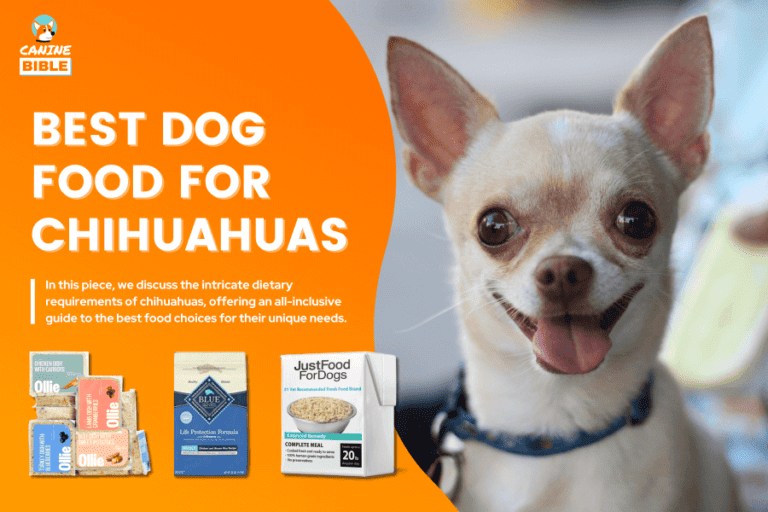
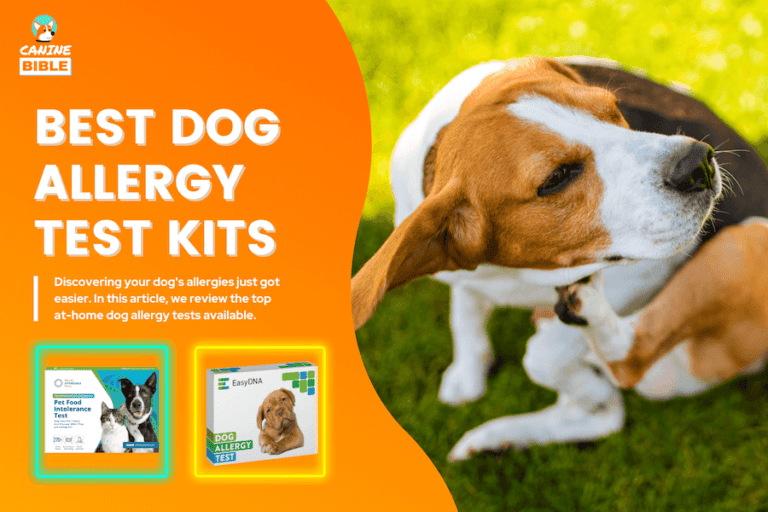
![Best Pet Insurance For Yorkshire Terriers [2024 Review]](https://www.caninebible.com/wp-content/uploads/2022/12/yorkshire-terrier-pet-insurance-768x512.png)
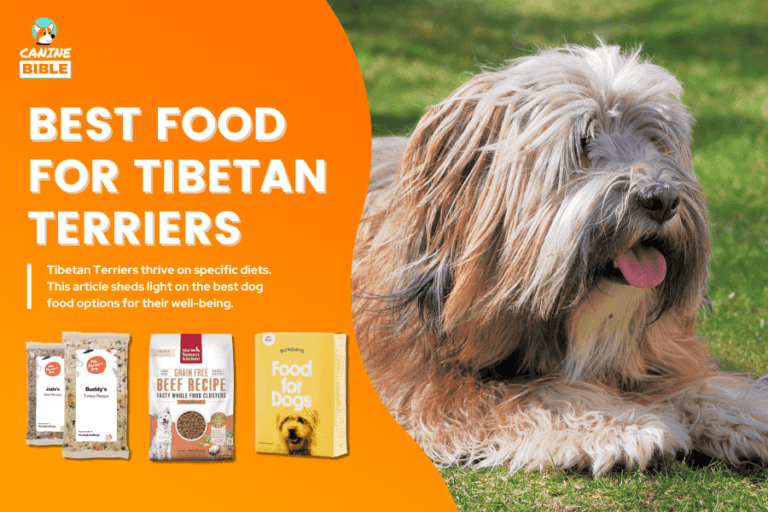
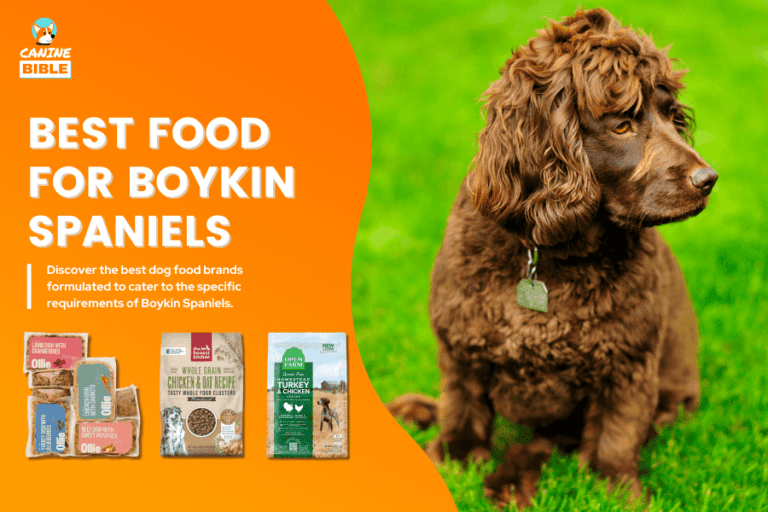
![Cheapest Monthly Dog Subscription Boxes [2024] - Reviews & Top Picks](https://www.caninebible.com/wp-content/uploads/2024/01/cheapest-dog-subscription-box-768x512.png)